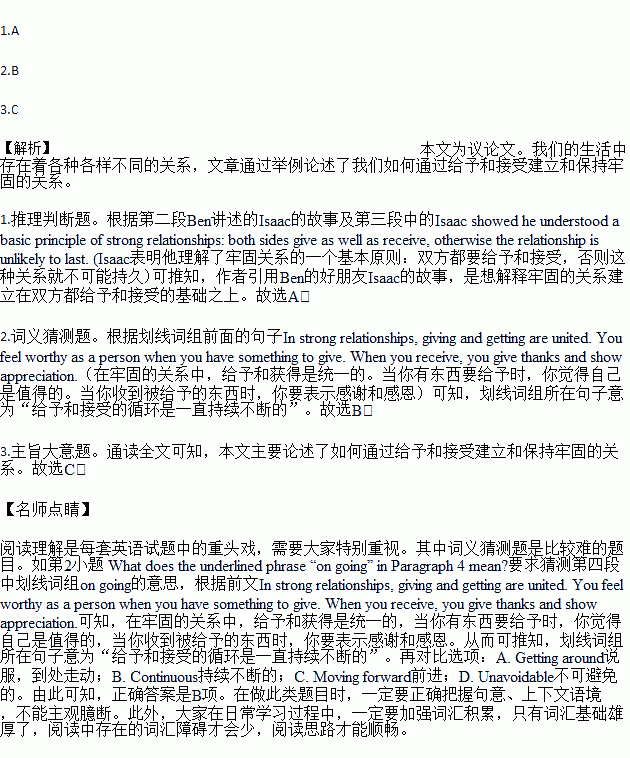题目内容
Throughout your life you will have many different kinds of relationships. Some relationships are casual and some are close. Strong, close relationships are fulfilling(有意义的). Most people need at least a few relationships of this type.
Ben liked to tell this story about his good friend Isaac: “Once after a big storm, tree branches were all over the yard, which meant I had a full morning of work. Then Isaac came, saying that since I had offered to drive us to the football game that afternoon, he wanted to save me the trouble of picking him up. He was three hours early, however, and he ‘just happened’ to have a rake(耙子) and heavy work gloves with him.”
Isaac showed he understood a basic principle of strong relationships: both sides give as well as receive, otherwise the relationship is unlikely to last.
In strong relationships, giving and getting are united. You feel worthy as a person when you have something to give. When you receive, you give thanks and show appreciation. The cycle of giving and receiving is on going.
One way to help keep relationships strong is to give a word of thanks to anyone who helps you. People can feel hurt if their help isn't acknowledged. For example, Amrit was growing frustrated because Curtis kept calling for help with his homework. So one day when Curtis called, he even thought about telling his brother to say that he wasn't at home. He was glad he didn't. Curtis had called to say how well he had done in his test and to thank Amrit for his help. Saying those two simple words-“Thank you”-can carry a relationship through rough times.
1.What's the author's purpose of mentioning Ben's good friend, Isaac’s story?
A. To explain strong relationships are based on both sides' giving and receiving.
B. To convince the readers that Isaac is one of Ben's trustworthy friends
C. To show that Ben owns the strongest relationship with Isaac.
D. To show what a close relationship can bring to both sides.
2.What does the underlined phrase “on going” in Paragraph 4 mean?
A. Getting around. B. Continuous.
C. Moving forward. D. Unavoidable.
3.The passage mainly tells us ________.
A. some examples of giving and receiving
B. people need different types of relationships
C. how to build and keep strong relationships through giving and receiving
D. one should remember to give thanks to others from time to time
 轻松课堂单元测试AB卷系列答案
轻松课堂单元测试AB卷系列答案 小题狂做系列答案
小题狂做系列答案
